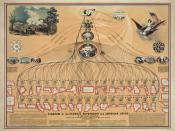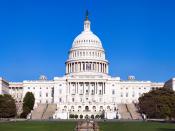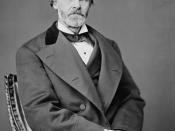The laissez faire is an economic doctrine that opposes governmental regulation of or interference in commerce beyond the minimum necessary for a free-enterprise system to operate according to its own economic laws. From the years of 1865 to 1900, the United States government clearly violated and interrupted the principles of the laissez faire through railroad land grants, control of interstate commerce, and antitrust activities.
During the 1800's, the federal government issued railroad land grants while the dispersing tax money, which was encouraged by the idea of laissez faire. Land grants were awarded to companies who were willing to build railroads in uninhabited areas. This way, instead of the government constructing railroads, the government would reward these companies financially if they would build railroads in specific areas. The national government would reward the companies financially mostly through land grants, but also through federal subsidies and cash grants. The national government did what's best for the people by allowing economic growth in areas that were not economically attractive.
The decision of the federal government to hand out economic incentives does go with the idealogy of laissez faire, even though the railroads took advantage of the land grants, the American people also did.
Since the national government was handing out large amounts of land grants, large amounts of monopolies were forming. With the monopolies came many problems including price discrimination. The railroads were privately owned, making the railroad companies almost a complete monopoly. These monopolies were viewed as harmful to the American people because they obstructed competition and the people demanded that the railroad operations be regulated. In the 1886 Wabash case, the Supreme Court ended an Illinois law outlawing long and short haul discrimination, with this case the Supreme Court established the exclusive power of Congress to regulate interstate commerce. As a...


